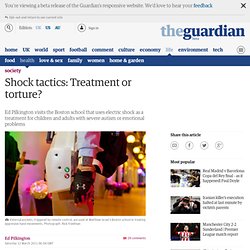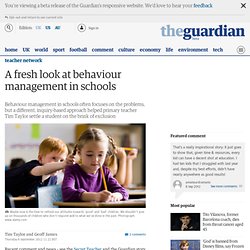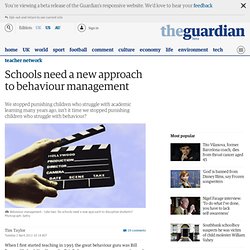

Structured Academic Controversy. Exploring a Growth Mindset. Shock tactics: Treatment or torture? The entrance to the Judge Rotenberg Centre, in a suburb of Boston, is a riot of bright colours and surreal designs.

The receptionist greets visitors from a deep purple chair in front of yellow and pink neon panels. Corridors are lit by elaborate chandeliers and lined with 6ft models of Bugs Bunny and Daffy Duck. There is a meeting space, called the Whimsy Room, that has a purple shag-pile carpet, and pink, mauve and lime-green walls hung with carnival masks. But the decor is far from the most unusual aspect of this establishment.
It is the only school in the US, perhaps the world, that uses pain as a treatment for children and adults with severe autism or emotional problems. Residents at the school carry small rucksacks, trailing wires that lead under their clothes and end in electrodes attached to their skin. Ever since it was founded, 40 years ago, the school has been the subject of fierce controversy. Israel read the novel and was hooked. The store looks like a chintzy shopping mall. A fresh look at behaviour management in schools. Recent comment and news - see the Secret Teacher and the Guardian story on levels of school exclusions - has made me realise how stuck the debate on developing children's good behaviour in schools has become.

Teachers are judged by how strict they are. Everyone who has been to school thinks they are an expert and many policies are based on half-baked ideas about emotional intelligence and reptile brains. Meanwhile, thousands of children are not going to school, teachers are under increasing pressure to command their students to behave, and parents are blamed for not being good role models. I am reminded of my first job as a teacher working in a school in an area of severe economic deprivation.
After four or five years I'd learned a wide range of behaviour management strategies based on rewarding good behaviour and punishing bad. Once I'd run out of ideas with Kyle all I could do was repeat my repertoire. In the end I was stuck. "Tell me about something that's going well for you Kyle? " Schools need a new approach to behaviour management. When I first started teaching in 1995 the great behaviour guru was Bill Rogers.

His book You Know the Fair Rule was my constant companion and Bill's practical, thoughtful and above all else effective advice was invaluable in helping me survive my first few months in the classroom as a newly qualified teacher. You Know the Fair Rule is about establishing with the children a set of clearly defined rules, which tell children how to behave in school and allow everyone to live together and get on with their learning. The rules are fair because they are negotiated and everyone agrees to them at the beginning.
This is a very effective strategy and I still start the year by creating a contract with my new class. The wording is drafted and agreed and everyone, including the adults, signs his or her name on the contract before it goes on the wall. Except when it's not. Every teacher will eventually come across a child who won't respond to the Fair Rule approach. Tom was one of these people. Teachers toolbox by Mediamerge. Carol Dweck: The Effect of Praise on Mindsets.